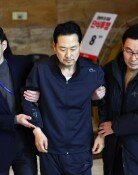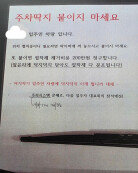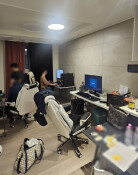Rights Group Takes Stand on Defectors
Rights Group Takes Stand on Defectors
Posted March. 16, 2006 03:13,
A spokesperson from a National Human Rights Commission of Koreas (NHRCK, president: Cho Young-hwang) research team said, The government should actively cooperate with the governments of countries that North Korean defectors are staying in, at a committee meeting yesterday.
The NHRCK established a North Korean Human Rights Research team in April 2003, but it has remained silent on the North Korean human rights issue up until now.
The meeting minutes (from September 2005 to February 2006) of a committee of all members under the NHRCK that Dong-A Ilbo obtained yesterday state that the NHRCK decided the aforementioned matter at the 25th committee of all members attended by all 11 NHRCK members December 12 last year.
Seven of the 10 members, except for the president, agreed with the decision. One member among those seven suggested that the NHRCK announce its plan not only to the Korean government but also to the neighboring governments such as North Korea, China, and the international organizations including the UN. Two of the seven members expressed no opinions.
Regarding the North Korean residents position, the committee of all members said, North Korean residents are foreigners, brothers, and have a special legal position at the level of semi-foreigners. This paved the way for the NHRCK to give opinions about North Korean human rights issues.
Concerning the North Korean human rights issues, the NHRCK has so far discussed the matter by dividing it into three stages. The first stage is to define the position of North Korean residents, second is to decide what it will express its opinions about, and the last is to decide how and what to say. The NHRCK is currently discussing the third stage.
The three-stage temporary plan that the NHRCKs special committee made in August 2005 says that the government should positively cooperate with governments of nations where North Korean residents are staying, that the NHRCK hopes the government and the North will come up with a measure to prevent the cause of North Korean defectors.
Regarding the human rights issues in North Korea including the housing of political prisoners and the freedom of speech and press, however, the NHRCK is said to have not mentioned any suggestions. With the absence of particular statements on human rights issues within North Korea, it appears that the NHRCKs suggestions will be pointed out as insufficient.
An NHRCK official noted, The special committee is now consulting on the final plan, and the committee of all members will adopt the final plan next month at the earliest, and added that the committees are examining whether to select the form as an opinion or as a recommendation.
The NHRCK originally planned to express its opinions on North Korean human rights issues by the end of last year, but the discrepancy in views among members prevented it from yielding any opinions.
Some NHRCK members have so far put on the brakes in discussing the matter, saying, The NHRCK should first listen to the governments policy on North Korean human rights issues, and others added, The NHRCKs mentioning of this could affect the North Korea policy.
Members, who are aggressively speaking of the issues, stressed Article 3 of the constitution saying, Koreas territory include the Korean peninsula and islands belonging to it, whereas passive members emphasized Article 1 and 2 of the Agreed Framework between the two Koreas saying that the two Koreas recognize each others regime and dont interfere with each others domestic issues.
ditto@donga.com







